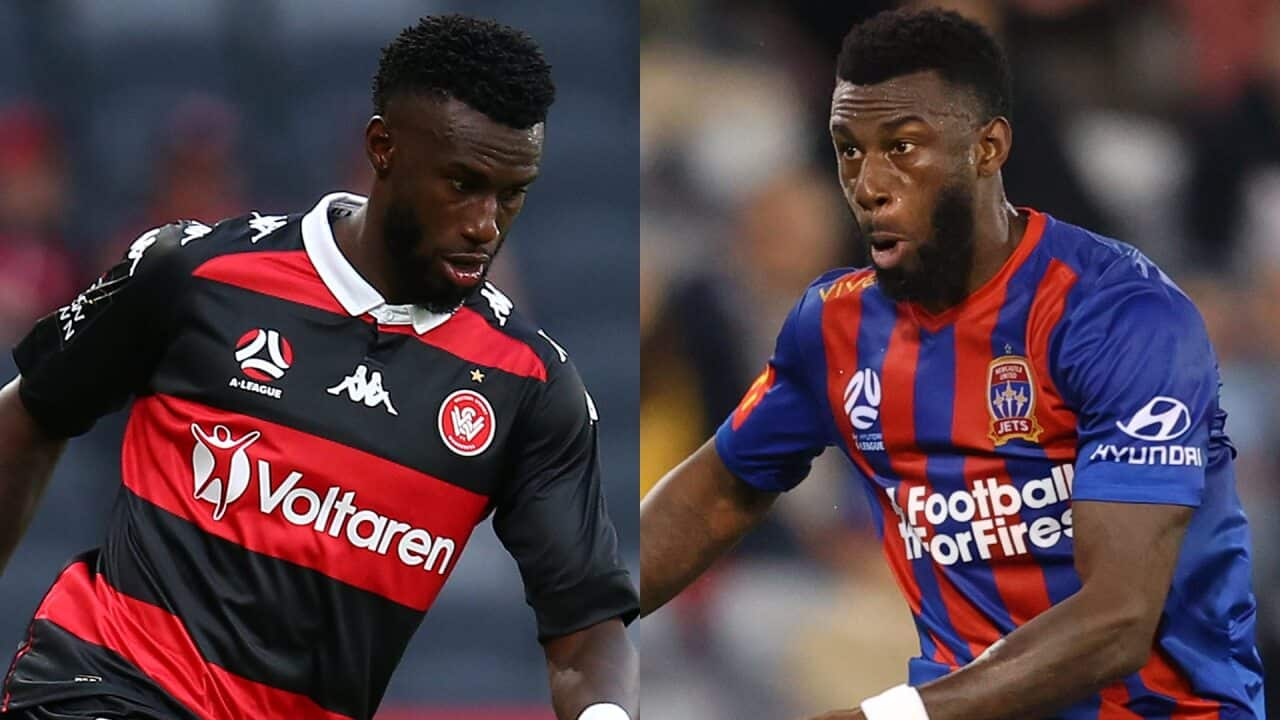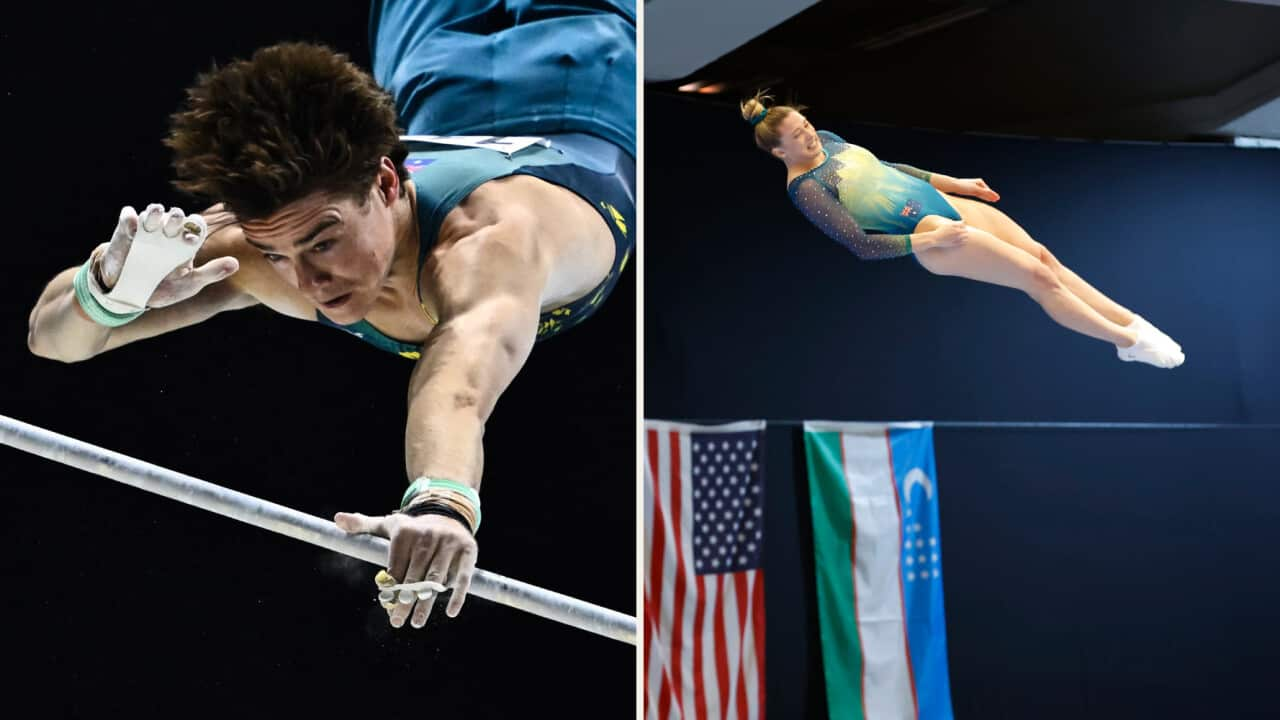In November 2020, 28-year-old Ibini wanted out from the Jets.
The club didn’t have a permanent coach and the owner hadn’t put money into the club in over a year.
Ibini was keen to leave the struggling club and join the Wanderers - the team closest to where his family lives, the area he grew up in, and where his former coach Carl Robinson was.
“The situation is draining him mentally, emotionally and physically,” Ibini's agent James Hardy told The World Game at the time.
“He’s taken 10 days leave with a medical certificate, as A-League players are entitled to do as per their standard player contracts.”
Ibini eventually got the move he desired in late December.
“I’m now in a happy environment and look forward to the season ahead,” Ibini told the Herald.
Questions were raised throughout the league as a result.
Had Ibini been let go because he had taken mental health leave? Could other players do that whenever they wanted to move clubs? Would this be a new theme for the very familiar transfer saga?
“There has been significant speculation, as if mental health can be used to get out of a contract,” said Beau Busch, a former A-League player and current co-CEO of the PFA.
“There is no such thing. They need to have a medical certificate from a medical professional to get access to the 10 days sick leave that they are entitled to.
“During that time, the player still remains a contracted player with the club.
“There is no way to terminate their contract on that basis. I need to be really clear on that.
“How it works is, under the terms of a standard playing contract, they have access to 10 days paid sick leave.
"In the event they are deemed by a medical professional as unable to perform work, they are then able to access that.
"After those 10 days, the club is then able to work with the player - hopefully in partnership. But if they are still unable to perform work, they are either able to go on annual leave or perhaps get extended paid sick leave.
“But equally so, the club may elect to - as they have the right to do so under the terms of the contract - say that the player is on unpaid sick leave.
“During that time, the player still remains a contracted player with the club.
“In the case of Bernie, the facts of the matter are if Bernie sought the assistant of a medical professional and he was deemed by that medical professional to be unfit for work, he then accessed his leave.
“In relation to Bernie leaving the club, as outlined by Lawrie McKinna (Newcastle Jets CEO) subsequently is that it was a commercial decision made by the club."
It was reported in December that Ibini had, with permission of the club, bought his way out of his remaining contract.
“If they were unable to agree terms, then Bernie would have remained a contracted Newcastle Jets player,” Busch said.
“It’s a very simple one in my mind. Players are able to seek support. But there is no mental health card that can be played to get out of a contract.”
Ibini’s former teammate, Steven Ugarkovic, remains at the Jets despite also wanting a move away.
Unlike Ibini, Ugarkovic did not take sick leave and remained training with the club in pre-season. And unlike Ibini, he was not offered the option to buy his way out of his remaining contract, according to Ugarkovic’s agent James Coorey.
Ibini was subject to a lot of criticism after the move, with even McKinna saying publicly that the striker was, "taking the piss".
“It’s disgraceful... these guys are getting a contract and then they can rip it up when they want,” McKinna told a luncheon in December.
“There’s certain agents in the world who are advising people to use that mental health thing and I think that’s disrespectful to anybody who suffers from anxiety, depression and stuff like that.
“That’s bullsh*t what he’s done. I can’t wait until he’s away from this club and out the place because you don’t want f**kers like that in Newcastle representing the club.”
McKinna, who himself must have been dealing with a lot of stress trying to keep the Jets afloat in uncertain times, later apologised for the remarks.
“I wish to apologise to Bernie for those remarks as they were entirely inappropriate,” he tweeted.
“We were obviously disappointed that a player of Bernie’s ability wanted to leave the club and that disappointment got the better of me.
“We were able to reach an agreement with Bernie and commercial terms were the sole basis as to why we agreed to release him.
“I wish Bernie all the best for the forthcoming season and again apologise for any harm caused."
The PFA are worried that the reaction to Ibini’s actions could discourage players from seeking much-needed help.
“What we know, and that is really clear in the PFA’s research, (is that) at any given time, about 25% of players are experiencing some level of psychological distress. The number of players that are accessing support is much lower than that,” Busch said.
“What we know is there are a lot of players out there that are having difficulty and they are not able to come forward and seek support for a variety of reasons.
“In our research, when we’ve tried to examine that, what we’ve found overwhelmingly is that the primary driver over whether a player seeks support is how they perceive the level of support they are going to receive and, if they do come forward, how that will be perceived by the wider community.
“So, how we deal with these matters has an impact because other players are going to read about it and are going to think: ‘how is it going to be perceived if I’m struggling and I come forward seeking support’.
“It’s really important that when we’re dealing with these matters, we deal with them in a really factual way rather than sort of adding speculation and creating conditions where people don’t think it’s OK for them to come forward because of the reaction they’re likely to get."
So what support does a current player have?
“Here in the A-League and W-League, and also with our national teams, we have a program called the player development program,” Busch said.
“Through that program we have trained experts and player development managers that are with every A-League and W-League club and are also with the two national teams.
“Their job is to connect players with a variety of expert services, one of which is our mental health referral network - a team of psychologists located all over Australia that the players are able to access on a confidential basis.
“All the costs that are associated with that are funded by the PFA. It is confidential and that is really important.
“The player can access that via their player development manager, who is bound by confidentiality as well. Or, they can go direct to a provider and seek support.
“Also, we’ve expanded in the past couple of years to ensure that players' partners also have access to support. And their immediate family.
“Because we know the vital role that they play and also that they experience a lot of the stresses, particularly recently, when the players go away for extended periods of times in hubs, go through stand-downs, go off to the Asian Champions League.
“The partners have been left having to carry a lot of the burden of parenting, home-schooling all these sort of things in a really difficult time.
“So we wanted to make sure we had really good support for the families as well.
“We see some wonderful stuff at some of our other clubs where it remains confidential, but players have experienced significant challenges and clubs have been very supportive of them.
“And that’s what we want to make sure we’re able to continue to do going forward."
Former A-League player and current Socceroo Mat Ryan believes a player’s mental health has a huge impact on their on-field performance.
“It’s probably the most pivotal aspect for an individual’s performance, just like in any industry," he said.
“If you’re able to maintain a clear and positive mind, then you’re not overthinking things and your training is able to take effect naturally and instinctively, which in my experience is key to being at your best.
Ryan admits his own mental health has been “full of challenges, with some moments more difficult than others.”
“There’s no doubt there’s a disillusioned perception that being a footballer is all glamour and that we have no worries or issues in the world,” Ryan explained from England.
“That couldn’t be further from the truth as we are all people and face many of the same challenges, problems and adversities that any human can.
“Don’t get me wrong, the highs are really high and an ecstasy that we try to recreate as often as we can, but the reality is there’s so many other players and teams vying for the same success.
"Therefore, (the highs) are so hard to obtain when you’re unable to or are susceptible to a lot of public opinion and criticism, and a lot of the negativities that can derive from that, especially if you’re not experienced or equipped in dealing with it.
“The good times wouldn’t be what they are without the bad times and vice versa, so I think, if you’re able to obtain a good balance and equilibrium, then you’re probably doing well at dealing with all that the lifestyle throws your way."
Ryan is very serious about supporting any teammates or fellow professionals who are struggling.
“I think people can learn a lot from one another’s experiences and the sharing of them through talking," he added.
"So I guess more encouragement for people to just talk about the challenges they face and bring worries and queries to life by talking about them, taking advantage of any help others can offer through similarities in their own experiences and sharing skills and techniques that allow an individual to overcome their own challenges they’re facing.
“Also, the realisation that an individual isn’t alone in the challenges they face can also be very comforting and the first step to overcoming a difficult time.
“(My advice to a teammate would be) to talk about it and get it off their chest as the old saying goes: ‘a problem shared is a problem halved’.
“There will be people around who have gone through similar things and can share skills and experiences to help one overcome whatever they’re going through.”
Busch insists football has a duty of care to its players.
“The most important part is the sport has a duty of care to protect its people,” he said.
“How we deal with these matters consistently will indicate to people how they are likely to be supported if they’re struggling. So it’s really important we take a factual approach to this.”










